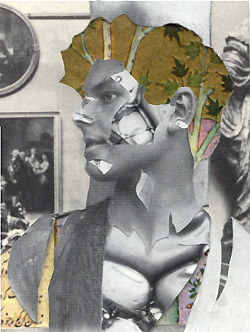CLOAK/3.6iiiIntimate lighting of a low-skied early summer, soft heat-filled air anchored to earth by a cat's cradle basket of high-tension sounds lined with starling flight veils—a smog of insatiable life—big city park oaks look on as Trishna's brother the Cloak dealer bicycles past. Almost daily, a typical delusion of improvement extends the network of housebound customers along his route. |
| After graduation, the advice—Be a museum guard, be a museum guard—but he didn't like black people anymore, he'd been mugged in a black neighborhood once and no one had offered to help him fix his bicycle. Be a museum guard, you'll be around art, it will inspire you—but he didn't like making art anymore either. |
| He watched his friends wind up in copy shops, coffee bars, photo developing places, he knew they'd end up as managers who'd still have the art thing going on, pushing the workplace gallery, the local pub gallery—until after another two or three years when it started to feel like something other people did, younger people, dumped with their graduating classes into the minimum wage pool, every year another bucketful of artists past their prime. |
| After graduation, every year, the cloaked and armored few who still had positive reactions were spirited away by keen-eyed keepers and put on display in the career vitrines for two or three seasons—after which they were always said to have suffered a breakdown. They'd be heard from no more; their slender output would be endlessly recycled at auctions and in print. He saw this was the best he might have hoped for, and on bad days he felt it would have been enough. |
| Just before his last year in art school, he'd had to go off Cloak because he'd been arrested, in a cemetery, while trying to dig up a younger sibling's coffin. Questioned, he'd been unrepentant, explaining that it had been two whole years he'd kept himself from starting this series of lithographs in which the corpse-child figured—that he'd resisted, until the night the thought occured to him that his subject wasn't really there—an empty grave. At which point he'd had to see, he could think of nothing else, do no other work—he'd had to know whether he'd have to end up looking elsewhere anyway. |
| During the time it took for the charges to be fashioned into various measures and bills, his mother sat on the Internet doing research about the drug Phagacet, which he and his sister Trishna still took, five years later, for their grief—she studied the drug company literature, got into the FDA files, infiltrated the underground sites—as she later said, she'd had her suspicions. And she found it written: |
|
Cloak, not synthesis, but transcription. The burial of empty coffins—a common preoccupation. Cloaked, they must see the dead. |
Every month he has to give a urine sample at a clinic near his parents' home. So he drinks instead.
   
|
